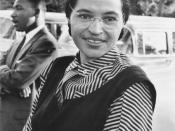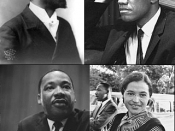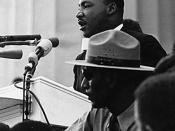It is a testament to the greatness of Martin Luther King Jr. that nearly every major city in the U.S. has a street or school named after him. It is a measure of how sorely his achievements are misunderstood that most of them are located in black neighborhoods.
He is still regarded mainly as the black leader of a movement for black equality.
Martin Luther King, Jr., (1929-1968), American clergyman and Nobel Prize winner, one of the principal leaders of the American civil rights movement and a prominent advocate of nonviolent protest. King's Challenges to segregation and racial discrimination in the 1950s and 1960s helped convince many white Americans to support the cause of civil rights in the United States. After his assassination in 1968, King became a symbol of protest in the struggle for racial justice.
Especially in the South of the U.S. the law did very little to protect blacks.
In fact, some laws, called segregation laws, often limited their freedom and discriminated against them. Such laws stated that blacks could not go to the same school with whites, that they had to use separate "colored only" rest rooms and drinking fountains, enter public places such as movie theatres and waiting rooms through separate entrances form whites, and ride in a special section in the back of buses and trains. These laws grew out of a racist attitude toward blacks. They were discriminated against solely in the basis of their skin color.
Even after the Supreme Court struck down segregation in 1954, what the world now calls human-rights offenses were both law and custom in much of America. Before King and his movement, a tired and thoroughly respectable Negro seamstress like Rosa Parks could be thrown into jail and fined simply because she refused to give up her...


